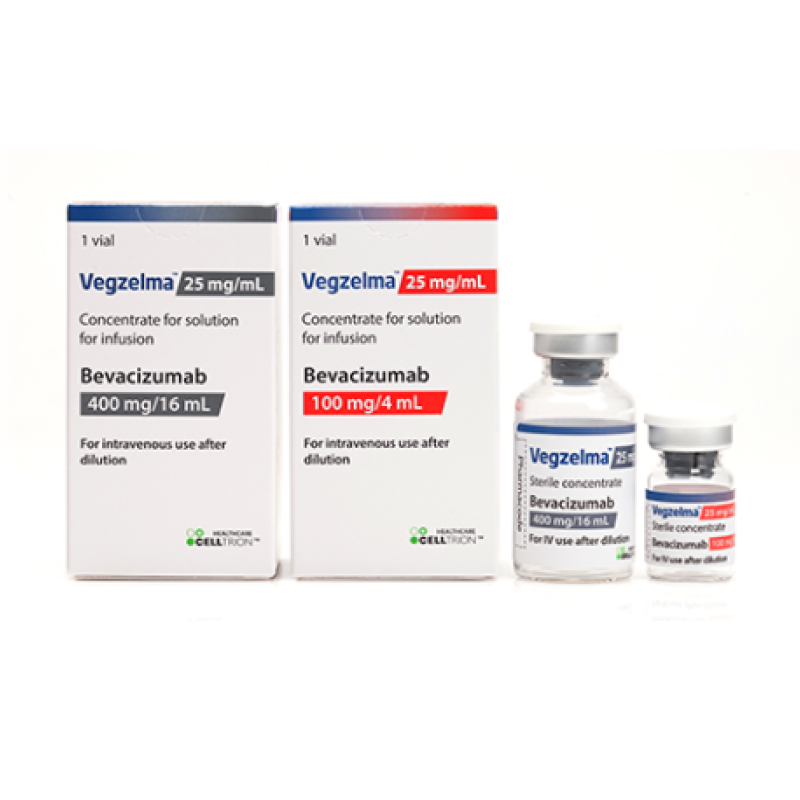Vegzelma (bevacizumab-adcd) vs Krazati (adagrasib)
Vegzelma (bevacizumab-adcd) vs Krazati (adagrasib)
Vegzelma (bevacizumab-adcd) is a biosimilar to the original bevacizumab (Avastin) and is designed to inhibit angiogenesis, the process by which new blood vessels form, thus starving tumors of nutrients and oxygen. It is commonly used in the treatment of various forms of cancer, including colorectal, lung, brain, kidney, and certain types of ovarian cancer. Krazati (adagrasib), on the other hand, is a small molecule KRAS G12C inhibitor specifically targeting a mutation in the KRAS gene, which is often found in non-small cell lung cancer (NSCLC); it is used in cases where this particular mutation is present. When deciding between these medications, it is crucial to consider the type of cancer, the presence of specific genetic mutations, and the overall treatment plan as determined by a healthcare professional.
Difference between Vegzelma and Krazati
| Metric | Vegzelma (bevacizumab-adcd) | Krazati (adagrasib) |
|---|---|---|
| Generic name | Bevacizumab-adcd | Adagrasib |
| Indications | Various types of cancer, including colorectal, lung, glioblastoma, kidney, and cervical cancers | Non-small cell lung cancer (NSCLC) with KRAS G12C mutation |
| Mechanism of action | Angiogenesis inhibitor; binds to vascular endothelial growth factor (VEGF) and prevents it from interacting with its receptors | Small molecule that targets KRAS G12C mutation and inhibits KRAS-dependent signaling pathways |
| Brand names | Vegzelma | Krazati |
| Administrative route | Intravenous infusion | Oral |
| Side effects | Hypertension, proteinuria, hemorrhage, arterial thromboembolism, gastrointestinal perforation, among others | Nausea, vomiting, diarrhea, fatigue, increased liver enzymes, among others |
| Contraindications | Hypersensitivity to bevacizumab or its excipients, pregnancy | Hypersensitivity to adagrasib or any component of the formulation |
| Drug class | Monoclonal antibody, angiogenesis inhibitor | KRAS G12C inhibitor |
| Manufacturer | Celltrion Healthcare Co., Ltd. | Mirati Therapeutics, Inc. |
Efficacy
Vegzelma (bevacizumab-adcd) and Lung Cancer
Vegzelma (bevacizumab-adcd) is a biosimilar to the original bevacizumab product, which is a monoclonal antibody that inhibits vascular endothelial growth factor (VEGF). By blocking VEGF, Vegzelma can prevent the growth of new blood vessels that tumors need to grow and metastasize. The efficacy of Vegzelma in the treatment of non-small cell lung cancer (NSCLC) has been demonstrated in clinical trials where it is used in combination with chemotherapy. Patients with NSCLC who received Vegzelma in addition to chemotherapy showed improved outcomes in terms of progression-free survival compared to those who received chemotherapy alone.
Krazati (adagrasib) and Lung Cancer
Krazati (adagrasib) is a newer medication designed to target specific genetic mutations in cancer cells. It is a small molecule that inhibits KRAS G12C mutations, which are present in a subset of lung cancers. The efficacy of Krazati in treating lung cancer has been evaluated in patients with NSCLC who harbor the KRAS G12C mutation. In clinical trials, adagrasib has shown promising results, with a significant number of patients achieving partial responses or stable disease. This indicates that Krazati can effectively shrink tumors or halt their growth in a meaningful number of patients with this specific mutation.
When considering the efficacy of these drugs, it is important to note that their use is highly dependent on the individual characteristics of the lung cancer being treated. Vegzelma's efficacy is more general to NSCLC, while Krazati's efficacy is specifically tailored to those with the KRAS G12C mutation. This highlights the importance of molecular testing in lung cancer to identify appropriate therapeutic options for patients.
Both Vegzelma and Krazati represent important components in the evolving landscape of lung cancer treatment. Vegzelma offers an option for broadening the therapeutic arsenal against NSCLC when combined with chemotherapy, while Krazati provides a targeted approach for those with a specific genetic profile. As with all cancer treatments, the efficacy of these drugs must be weighed against their potential side effects, and their use should be guided by a healthcare professional specialized in oncology.
Regulatory Agency Approvals
Vegzelma
-
European Medical Agency (EMA), European Union

-
Food and Drug Administration (FDA), USA

Krazati
-
Food and Drug Administration (FDA), USA

Access Vegzelma or Krazati today
If Vegzelma or Krazati are not approved or available in your country (e.g. due to supply issues), you can access them via Everyone.org.
How it works

Make an enquiry
Choose the medicine you want to buy, answer a couple of questions, and upload your prescription to speed things up. We’ll get back to you within 24 hours.


Make an enquiry
Choose the medicine you want to buy, answer a couple of questions, and upload your prescription to speed things up. We’ll get back to you within 24 hours.


Breeze through the paperwork
We'll guide you through the required documents for importing unapproved medicine, ensuring you have all the necessary information.


Get a personalized quote
We’ll prepare a quote for you, including medicine costs and any shipping, administrative, or import fees that may apply.


Receive your medicine
Accept the quote and we’ll handle the rest - sourcing and safely delivering your medicine.

Some text on this page has been automatically generated. Speak to your physician before you start a new treatment or medication.
Let's talk
If you have any questions, call us or send us a message through WhatsApp or email:
Contact us




